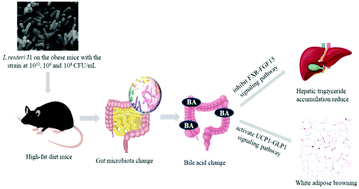Lactobacillus reuteri J1 prevents obesity by altering the gut microbiota and regulating bile acid metabolism in obese mice
Abstract
Obesity is closely related to metabolic syndromes such as hyperlipidemia and diabetes and has become a global public health problem. Probiotics are now used as a treatment for obesity, but the mechanism by which probiotics treat obesity remains unclear. Herein, we investigated the effects of Lactobacillus reuteri J1 ( L. reuteri J1) on obese mice with the strain being administered at 1010, 109 and 108 CFU mL−1 and explored the possible underlying molecular mechanism. The results revealed that L. reuteri J1 prevented weight gain, lowered fat mass and relieved dyslipidemia, and improved glucose homeostasis and insulin sensitivity. Moreover, the effect of obesity reversal exhibited dose-dependence to some extent. More importantly, mice treated with L. reuteri J1 altered the gut microbiota and bile acid (BA) composition. Analysis of the gut microbiome showed that L. reuteri J1 increased the relative abundances of Lactobacillus, Akkermansia and Clostridium, which strongly correlated with ursodeoxycholic acid (UDCA) and lithocholic acid (LCA). UDCA and LCA are thought to inhibit farnesoid X receptor (FXR) and activate transmembrane G protein-coupled receptor 5 (TGR5) expression, respectively. Consistent with the increase in the BA pool, L. reuteri J1 treatment inhibited the ileum FXR/FGF15 signaling pathway but activated the hepatic FXR/SHP signaling pathway, resulting in reduced hepatic triglyceride accumulation. In addition, L. reuteri J1 treatment promoted adipose browning by upregulating the expression of uncoupling protein 1 (UCP1), which was mainly due to the BA receptor TGR5. These results demonstrated that L. reuteri J1 could treat obesity by inhibiting the FXR signaling pathways and remodeling white adipose tissue, linked with UDCA and LCA which are affected by intestinal microbiota.



 Please wait while we load your content...
Please wait while we load your content...